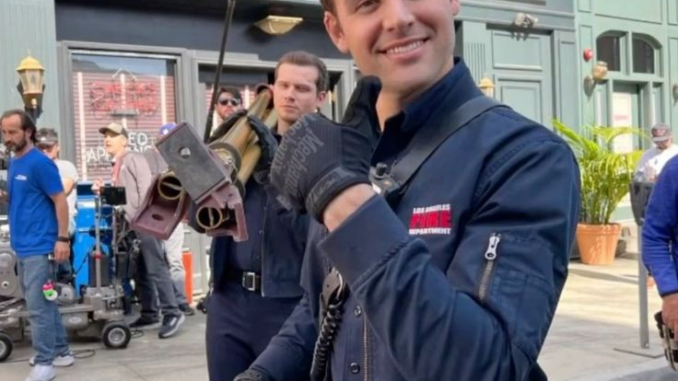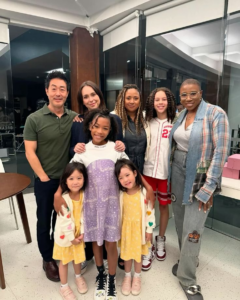
Lone Star’s Intense Final Tragedy Is Ruined By 9-1-1
Lone Star has become a fan-favorite for its gripping storylines, intense emotions, and captivating characters. But when the final tragedy of the latest season aired, fans were left feeling less than satisfied. The raw, powerful narrative that had been carefully built up throughout the season came to an unexpected halt, overshadowed by another series that many felt had no business intervening. That series? 9-1-1. In this article, we’re diving deep into how 9-1-1 ruined Lone Star’s intense final tragedy and why this crossover moment was a huge disappointment for fans.
The Build-Up: Lone Star’s Promise of a Heart-Wrenching Finale
From the very beginning of Lone Star’s latest season, we were promised an emotionally charged finale. The characters, especially the ones who had been through unimaginable trauma and growth, were building up to a powerful, gut-wrenching tragedy that would leave the audience reeling. Fans were glued to their screens, anticipating a heart-stopping moment that would seal the emotional weight of the season.
Why Fans Were So Invested in Lone Star’s Emotional Arc
Lone Star’s ability to combine high-octane action with deep emotional storytelling is one of its biggest strengths. The characters aren’t just faces on a screen; they feel real, their struggles are palpable, and their growth throughout the season keeps fans rooting for them. As the finale approached, it felt like everything was leading to an earth-shattering event that would leave viewers speechless.

But then, something unexpected happened.
9-1-1 Crossover Moment: A Disruptive Twist in the Tragedy
Instead of fully immersing us in the emotional fallout of Lone Star’s final tragedy, the crossover event with 9-1-1 felt like an unwelcome interruption. While crossovers can be exciting, this one diluted the intensity of the moment. Fans were preparing for an emotional rollercoaster, only to find themselves distracted by the appearance of 9-1-1 characters.
What Went Wrong?
Here’s the problem: the inclusion of 9-1-1 characters shifted the focus away from the personal, deeply emotional core of the tragedy. It felt like the narrative was hijacked by the flash and dramatics of the crossover, making it harder for viewers to connect with the tragedy in the same way they had been throughout the season.
Lone Star’s Powerful Moments Lost in the Crossover Shuffle
The tragic end was supposed to be the culmination of everything Lone Star had built up. The characters had grown, faced challenges, and were now standing on the edge of something truly devastating. But with the sudden infusion of 9-1-1 characters, it felt like the emotional impact was lost. Fans were left to wonder: Was the focus on Lone Star’s powerful moment, or was it just another ploy to tie into the larger 9-1-1 universe?
The Impact of the Crossover on Character Development
One of the most disappointing outcomes of the crossover was how it derailed the character arcs of key Lone Star figures. These characters had been through so much – trauma, loss, and growth – and the final tragedy should have been their moment to shine. However, the crossover meant that their growth took a backseat to 9-1-1’s flashier drama.
A Missed Opportunity for Meaningful Closure
Instead of letting Lone Star’s characters have the spotlight and proper closure, the show felt rushed and distracted. It’s easy to imagine how powerful it could have been if the show had focused entirely on the emotional journey of its main characters, without the need to pull in outside forces.
Why Crossovers Can Be Both a Blessing and a Curse
While crossovers can be a fun way to connect shows and keep viewers engaged, they can also be detrimental when handled poorly. In this case, the decision to bring 9-1-1 into Lone Star’s tragic finale was a poor choice. The emotional tension that had been carefully built over the course of the season was suddenly undercut by the unnecessary need to push 9-1-1’s narrative forward.
Fans Speak Out: The Disappointment of the Crossover Moment
Social media was abuzz with frustrated fans expressing their disappointment. Many felt that the tragic end of Lone Star deserved to stand on its own, free from the interference of another show. The emotional resonance that fans had been eagerly anticipating was drowned out by the forced crossover, leaving many questioning whether it was worth it.
The Reality of Mixing Different Show Universes
The concept of crossing over shows isn’t new, but it’s a tricky balancing act. When done right, crossovers can feel like a natural extension of both shows, enhancing the experience for fans. But when done poorly, it feels like a distraction and an insult to the investment viewers have made in the characters and storylines. In the case of Lone Star, the 9-1-1 crossover did more harm than good.
How Should Lone Star Have Handled the Finale Differently?
Looking back, it’s clear that Lone Star could have delivered a more impactful finale without the interference of 9-1-1. By focusing solely on the tragedy and emotional growth of the Lone Star characters, the show could have brought closure to the season in a more satisfying way. Fans would have been left with a sense of completion, rather than a feeling of confusion and dissatisfaction.
A More Focused Finale: The Case for Emotional Depth Over Flashy Crossovers
What Lone Star fans needed was depth. The show has always thrived on its ability to blend action with emotion, and the finale could have been a testament to that. By removing the crossover and focusing entirely on the emotional weight of the tragedy, Lone Star could have delivered a finale that was both powerful and satisfying.
The Fallout: What This Means for Lone Star’s Future
As we look ahead to future seasons of Lone Star, the impact of this controversial finale will likely linger. Fans are already wondering whether future seasons will continue down the path of flashy crossovers or return to the deep, emotional storytelling that made Lone Star so compelling in the first place.
Can Lone Star Recover from the Missteps of the Finale?
It remains to be seen whether the show can bounce back from this misstep. With the right adjustments, Lone Star can return to its roots and deliver the kind of emotionally resonant stories that made it a fan favorite. However, if the trend of excessive crossovers continues, it could risk alienating viewers who crave authentic, character-driven narratives.
Conclusion: A Tragic Misstep in an Otherwise Great Show
Lone Star’s final tragedy had the potential to be one of the most memorable and heart-wrenching moments in television history. Unfortunately, the unnecessary crossover with 9-1-1 overshadowed that moment and left fans feeling disappointed. While crossovers can be exciting, they must be handled with care to avoid detracting from the story’s emotional depth. For Lone Star, the decision to bring 9-1-1 into the mix proved to be a miscalculation. If the show returns to its focus on character-driven drama and emotional storytelling, it can still reclaim its place as a beloved series.
FAQs
- Why did the 9-1-1 crossover ruin Lone Star’s finale? The 9-1-1 crossover overshadowed the emotional depth of Lone Star’s final tragedy, distracting viewers from the personal stakes of the episode.
- What did fans expect from Lone Star’s finale? Fans were hoping for a deeply emotional and powerful conclusion to the season, focusing on the growth and struggles of the Lone Star characters.
- How can crossovers affect a show’s storyline? Crossovers can be exciting but can also disrupt the flow of a story if they divert attention from the main narrative or characters.
- What could Lone Star have done differently in the finale? Lone Star could have focused solely on its own characters and their emotional journey, delivering a more satisfying and powerful conclusion.
-
Will Lone Star continue using crossovers in future seasons? It’s unclear, but if crossovers continue, the show risks alienating fans who prefer the deep, emotional storytelling that made it successful.